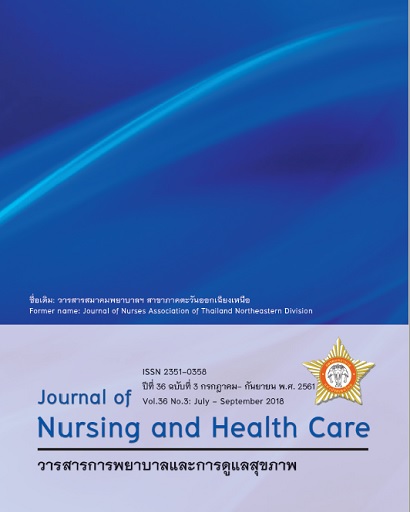สถานการณ์การรับประทานอาหารโซเดียมสูงและการรับรู้เกี่ยวกับการบริโภค อาหารโซเดียมสูงกับการเกิดโรคไตเรื้อรังของผู้ป่วยโรคไม่ติดต่อเรื้อรัง High sodium consumption situation and perception relevant to high sodium consumption associated with chronic kidney disease among people with chronic non-communicable disease
บทคัดย่อ
The first phase of participatory action research aims to explore situation of high sodium consumption and
perception relevant to high sodium consumption associated with chronic kidney disease among people with
chronic non-communicable disease (CNCD) in 7 villages of Chiang Yuen District, Mahasarakham province. Study
participants include 1) 100 patients with hypertension and/or type 2 diabetes mellitus 2) 100 family caregivers
3) 100 village health volunteer and community leaders and 4) 4 public health personnel working in local hospital.
Ten focus group discussions, 10 in-depth interviews, participatory and non-participatory observation, and 7
brainstorming meetings to share and discuss relevant community situation are conducted in this phase. Data
analysis uses content analysis method.
Results from sodium consumption situation analysis among the patients with CNCD in this study demonstrate
that sodium consumption among people with CNCD is relevant to family and community eating custom and
pattern. Maintaining typical taste of the food by adding several kinds of sodium containing food seasoning is
general in the community. Preserving usual cooking and eating habit makes no difference between patients and
other family and community members as well as reduces daily burden. Additionally, the study participants use
their sense from food tasting to limit sodium consumption. The participants do not put effort in searching for the
information concerning salt restriction that they do not know. Perceptions among study participants that taking
diabetes and antihypertensive medications has more impact on their kidneys comparing with reduced salt
consumption is associated with medication nonadherence among the patients with CNCD. Consequently, this
perception contributes to less awareness to restrict dietary sodium among the participants. In conclusion, findings
from Phase I will inform the plan to support self-management among people with non-communicable disease for
chronic kidney disease prevention for next research phase.



